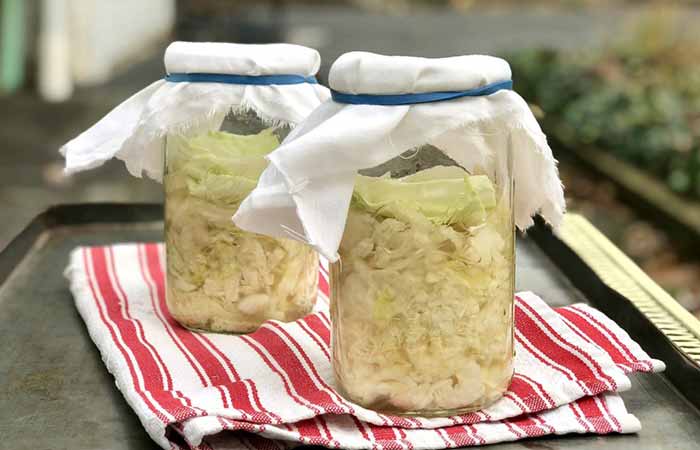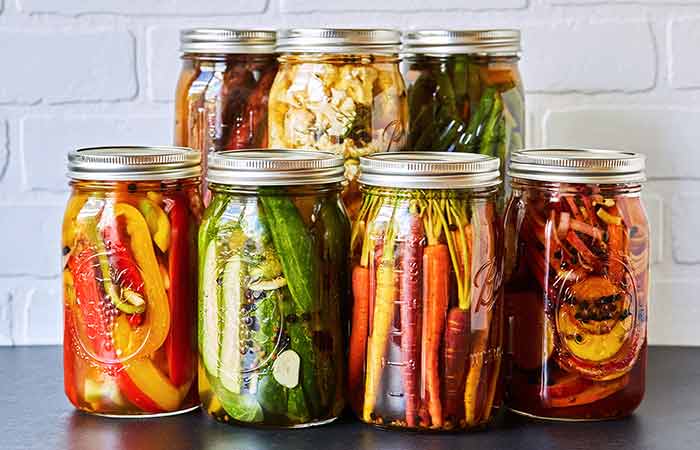Best Probiotic Vegetables & Foods for Vegans
Like most people, you likely associate ‘probiotics’ to yogurt. But if you’re a vegan, there are plenty of plant-derived probiotic-rich foods that you can enjoy. And, you can make many of these vegan probiotic foods at home.
Best Vegan Probiotics
1. Sauerkraut
Sauerkraut is a probiotic-rich cabbage dish associated with German cuisine, but that originated in China in 200 BCE. It’s packed with probiotics, potassium, as well as vitamins C and K.

When making Saurkraut, the cabbage has to undergo Lacto-fermentation. This means you should ferment finely cut cabbage in brine (a saltwater solution).
Through Lacto-fermentation, the Lactobacillus bacterium that’s present in cabbages converts its sugars into lactic acid. The product of this fermentation process is a sour and crunchy condiment that you can delight in on its own or add into salads and sandwiches.
You can also get Sauerkraut in supermarkets and health-food stores. Unpasteurized sauerkraut products are ideal because pasteurization obliterates a lot the beneficial bacteria.
2. Pickles Vegetables
Pickling your vegetables in a saltwater concentration (brine) creates a delicious vegan side dish or snack that’s probiotic-rich.

You can ferment most vegetables, but popular options include:
- Carrots
- Cucumbers
- Green beans
- Radishes
- Red bell peppers
- Cauliflower
For extra flavor, you can add spices and herbs, such as:
- Bay leaves
- Garlic
- Coriander seeds
- Black peppercorns
Fermented vegetables are nutrient-rich, but they also have a high concentration of sodium. To limit the risks of a high-salt diet, like water retention and high blood pressure, you should enjoy pickled dishes in moderation.
3. Kimchi
Kimchi is a highly spiced fermented cabbage dish that’s synonymous with Korean cuisine. It’s rich in antioxidants, probiotics, and vitamins.

Preparing Kimchi entails a process similar to that of making Sauerkraut, but in this case, you need to add some vegetables and spices.
You can get Kimchi in health-food stores, or you can prepare it at home. Before ordering Kimchi in a restaurant, you should check whether its vegan.
4. Tempeh
Tempeh is a soy-based dish that’s akin to tofu, but its preparation involves fermenting the soybeans. The fermentation process ensures Tempeh protein-rich as well as probiotics-rich. And with its firm texture, you can blend it with a wide range of dishes.
You can add Tempeh to stir-fries, sandwiches, burgers, salads, and more. Besides, it’s an excellent vegan source of protein.
5. Sourdough Bread
To prepare sourdough bread, you need a sourdough starter that is made of fermented flour and water. For you to use the starter, again and again, you should ‘feed’ it with flour regularly.
Not every sourdough bread is probiotics-rich; check the ingredients before you make a purchase. Many stores and bakeries don’t use a starter when making their sourdough.
6. Kombucha
Kombucha is a probiotic-rich fermented tea that’s become trendy in recent years. To brew Kombucha, you need SCOBY – symbiotic cultures of yeast and bacteria. The jellylike mass doesn’t look appetizing, but it’s packed with beneficial microorganisms.

SCOBY has a centuries-long rich history. Its beneficial properties are articulated in a study published in the Journal of Medicinal Food. You can buy SCOBY starters in health-food stores or online. Some supermarkets and coffee shops also sell ready-brewed Kombucha.
Kombucha has low-levels of alcohol content. Some versions are classified as beer because of their level of alcohol content. Therefore, they’re not ideal for some people, like those who’re breastfeeding or pregnant.
Why Do You Need Probiotics?
Probiotics are ‘beneficial’ bacteria that are essential for a healthy digestive system and immunity system. You can get them from various food sources or dietary supplements.
“But doesn’t bacteria cause of diseases?” The human body is packed with about 100 trillion microorganisms; over 500 species live in any healthy bowels.
These microorganisms generally won’t make you sick. The microbes help keep harmful bacteria in check, boost immune function, and aid in food digestion.
But sometimes, the digestive system becomes unbalanced and is overwhelmed with harmful bacteria. In this case, probiotics help retain the balance between the good and bad microorganisms, ensuring you have a healthy gut. Probiotics also have protective properties and thus bolster your immune function and limit pathogens’ ability to take hold and cause major diseases.
Health Benefits of Vegetable Probiotics
There is extensive research going on probiotics and their impact on health. Research shows that different strains have varying effects on health and well-being. nsive So it may be a good idea to eat a wide range of probiotic vegetables and foods so that your body gets different strains of probiotics.
Probiotics will potentially bolster your health in the following aspects:
- Improved digestion: Probiotics enhance the breakdown of food as well as its absorption. They may also help you manage the symptoms of irritable bowel syndrome (IBS) and Crohn’s disease.
- Vaginal health: The vagina has plenty of bacteria. Birth control pills, antibiotics, and spermicidal can shift the chemical balance in your vaginal tract leading to infections. Probiotics can help keep these vaginal health issues away by maintaining the balance.
- Reduced vulnerability to cancer: Studies reveal that shifts in gut microbiota may increase your susceptibility to diseases like colitis-associated cancer and inflammatory bowel syndrome (IBD). Researchers, therefore, believe that probiotics can reduce the risk of these diseases.
- Mental health: Experts believe that there is a link between gut health and mental health. Research indicates that probiotics are likely to reduce feelings of anxiety and depression, although more research is needed to confirm this.
- Limit antibiotic side effects: More than a third of people develop ADD (antibiotic-associated diarrhea) after taking antibiotics. Some medical experts recommend paring antibiotics with probiotics to prevent the severity of ADD.
- Reduced vulnerability to metabolic diseases: Common metabolic disorders include type 2 diabetes, non-alcoholic fatty liver disease, and obesity. Regular consumption of probiotics can help prevent and manage these conditions.
- Diabetes management: Research indicates that probiotics can enhance lipid metabolism and glycemic control in type 2 diabetes patients.
Types of Probiotics from Veggies
The most studied and the most commonly consumed species of probiotics are Bifidobacteria and Lactobacillus.
Bifidobacteria: This species is usually used in supplements and foods. The benefits include:
- Bolster immunity function
- Limit the proliferation of harmful microbes in your gut
- Help in the digestion of lactose
Lactobacillus: This species of microbes produce lactase, an enzyme that essential for digestion lactose or milk sugar. Besides, Lactobacillus generates lactic acid.
Lactic acid is vital when it comes to controlling harmful bacteria. It also helps your body absorb minerals as well as fuels your muscles. Lactobacillus occurs naturally in the mouth, small intestine, and vagina.
Common subtypes of Probiotics
Probiotics have various strains/subtypes. Each subtype impacts your body differently. You should check the probiotic subtype names on the supplement and food labels. Typically, the strain name is conjoined with the species name.
For instance, Lactobacillus or Bifidobacteria are typically abbreviated as L. or B. and then combined with individual strain names, like acidophilus. You, therefore, find L. acidophilus on the supplement or food labels.
Here are the common probiotic strains that you’ll find on supplement and food labels:
B. animalis: This strain helps counter food-borne bacteria, and boosts your immune function and digestion.
B. breve: This strain is found in the vagina and in the digestive tract. It helps fends off infection-causing yeast or bacteria. It also ferments sugars and thus bolsters your body’s ability to absorb nutrients.
B. lactis: This strain is generated from raw milk.
B. longum: This strain occurs in the gastrointestinal tract. It’s an antioxidant, and it helps in the digestion of carbohydrates.
L. acidophilus: This strain thrives in the vagina and in your small intestine. It deters harmful vaginal bacteria and improves digestion.
L.reuteri: This strain lives in your mouth and intestine. One study revealed that it limits the growth of harmful oral bacteria that fuels tooth decay. It also boosts digestion.
Increasing Probiotics in Your Diet
You should start by simply adding probiotic-rich foods to your diet. It’s also prudent for you to track the probiotics you’ve introduced, and overtime evaluate how they’ve impacted your overall health.
A lot of probiotic-rich food items like yogurt and fermented cheeses are non-vegan. But that shouldn’t deter you; as you’ve seen, there are numerous probiotic-rich vegan delicacies you can enjoy.